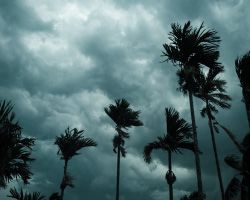Health library
Back to health libraryStay safe before, during and after a hurricane

Even if you don't live right on the water, it pays to be ready for hurricanes and serious storms. Planning now protects your family in times of crisis.
Here are some key ways to prepare and stay safe during a hurricane or other disaster, based on advice from the Centers for Disease Control and Prevention (CDC) and other experts.
Before the storm
Make a plan to prepare for natural disasters. Taking steps early can help you stay safe—even if the situation changes quickly. Here are some steps to take today:
- Check that carbon monoxide and smoke alarms are working.
- Gather important documents to take with you if you have to evacuate.
- Know your nearest shelter and how to get there. If you have pets, look for pet-friendly shelters or hotels or ask friends or family outside the storm area if they can host your animals.
- Keep your car's gas tank full.
- Make a list of important phone numbers—add them to your phone and keep a paper copy handy. Make sure everyone in your family knows how to stay in touch if cellphones are not working.
- Plan how you will prepare your home, such as securing windows and shutting off power. Gather any tools or materials you will need.
- Stock up on emergency supplies. Make sure you have food, water and any medicines you or your family will need. Don't forget personal items and toiletries.
During the storm
Closely monitor the latest news, especially National Weather Service alerts. Always follow authorities' evacuation instructions. If you evacuate, unplug your appliances before you leave. Never drive on flooded roads.
If staying at home is the safest option, keep the following advice in mind:
- Keep your emergency supplies nearby and accessible.
- Stay indoors and away from windows.
- Never use charcoal or generators indoors, and be careful when burning candles (flashlights are safer).
- If you smell gas, leave your home and do not turn lights on or off or use electrical equipment.
- Continue to monitor weather updates in case conditions change and you need to leave.
After a hurricane
The danger isn't over when the storm is. Roads may be flooded, and water can make buildings or appliances unsafe. Severe storms can affect drinking water too. If you're returning to your home:
- Heed warnings about unsafe roads.
- Never use a wet electrical device. If you see signs your electrical or gas appliances were wet, unplug them until an electrician can make sure they are safe to use.
- Stay away from downed power lines and damaged buildings.
- Make sure that your food and water is safe before consuming it.
From severe storms to other emergencies, there's a lot you can do to protect yourself and your family. For more ways to stay safe, visit our Disaster preparedness health topic center.
Reviewed 7/15/2025
